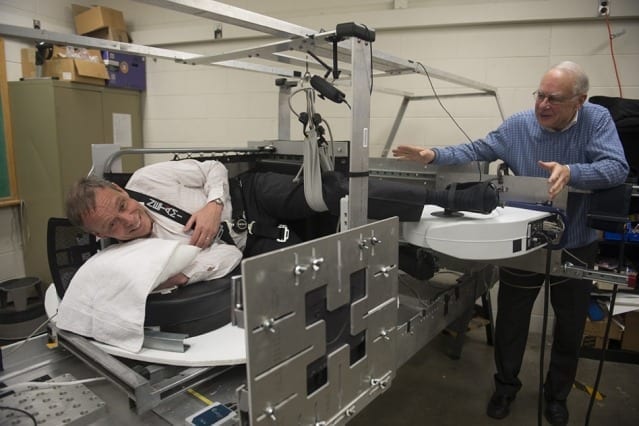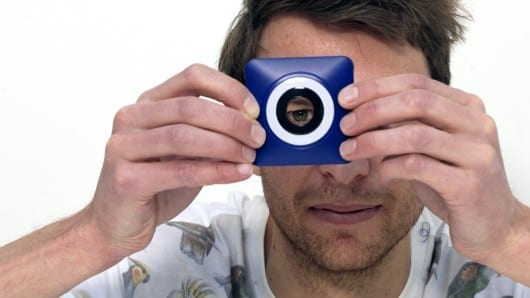
Many states are using the technology to scan driver’s licenses to prevent identity fraud.
It led to the arrest of a suspected arsonist in New York. And while facial recognition technology could not identify the Boston Marathon bombing suspects, police used the software in their search.
These recent headlines illustrate the benefits this technology provides for law enforcement agencies in an investigation. Not surprisingly, many businesses also see an advantage in using facial recognition, not for crime-fighting, but to reach customers. However, Brian Mennecke, an associate professor of information systems at Iowa State University, questions whether customers are ready for it.
“It’s beneficial for a company to have more information about you because it allows them to customize their service and products as well as their advertising. And it’s certainly beneficial to the customer because they don’t have to waste time essentially relaying that information,” Mennecke said. “But the other side of this story is really the privacy aspect.”
Retailers have collected data on customer preferences and demographics for years, but biometrics takes it to a new level. Facial recognition software is already used in social media applications, like Facebook’s “tag suggestions.” The technology scans uploaded images and then matches the biometrics to names and faces “tagged” in other photos in its database.
It may seem like a cool feature, except the users cannot control or modify this profile, Mennecke said. In fact, they give Facebook permission to create and maintain a profile database as part of the “terms of service” they agree to when signing up for Facebook.
Business applications
Intel is also using facial recognition software in its digital signage displays, Mennecke explained in a study published online in the journal Business Horizons. The displays use touch screens to interact with the customer and feature everything from video and graphics to Internet sites and broadcast clips.
The technology also identifies general characteristics like gender, age and race and tracks how customers use the display and for how long. Mennecke says the Intel system promises anonymity as it builds a digital customer profile that includes physical characteristics. It’s what Mennecke calls a “marketing avatar” or “mavatar.”
Businesses want that personalized information to provide better customer service and to make the most of advertising dollars by directly targeting consumers with specific, detailed information.
“If you watch people as they walk around public places, like the mall, people mostly ignore signs and billboards. This is because we are bombarded with so many irrelevant ads and displays. The more relevant the ad, the more likely that someone will look at it. So if ads can be targeted, retailers can do a better job of grabbing your attention,” Mennecke said.
A price for privacy
Facial recognition technology promises benefits for consumers, if they are willing to sacrifice some privacy. Mennecke says retailers could use the software in digital kiosks or smart phone applications to identify and collect consumer information. However, he believes it will still be a few years before that happens because people are hesitant to opt into a service that uses a biometric scan of the face.
The Latest Bing News on:
Facial Recognition
- Facial recognition coming to LA transit after passenger fatally stabbedon April 29, 2024 at 2:51 pm
Transit officials in Los Angeles have declared a public safety emergency over the stabbing of a 66-year-old woman in the city’s Metro transit system.
- SIA and IBIA say facial recognition for airline passengers is safe, necessaryon April 29, 2024 at 12:27 pm
Face biometrics are currently in use for traveler verification at TSA security screening checkpoints in more than 80 airports across the country.
- CBSA Eyes Smartphone Facial Recognition Tech for Up to $34 Millionon April 29, 2024 at 11:12 am
The Canada Border Services Agency (CBSA) is planning a federal project that could see travellers using facial recognition technology via smartphones to identify themselves at border crossings. The ...
- Dayton police use facial recognition technology to identify assault suspecton April 29, 2024 at 9:24 am
Dayton police used facial recognition technology to identify a suspect in a brutal assault, after other leads had dried up. City says it does not have broader plans to use the technology.
- TS EAPCET 2024: JNTU-Hyderabad to adopt facial recognition system to curb impersonationon April 29, 2024 at 9:14 am
Following the final successful test run on Sunday, the university decided to incorporate it in this year’s entrance test.
- Facial recognition off limits to MTA for fare evasion enforcementon April 29, 2024 at 6:07 am
Facial recognition technology is now formally off limits to the Metropolitan Transportation Authority in its quest to recoup some of the hundreds of millions in unpaid fares each year. Tucked into the ...
- Metro board ponders facial recognition, other security measures after subway killingon April 26, 2024 at 3:00 am
Could AI have prevented the killing of a woman on an L.A. subway. Metro is looking at facial recognition technology, fare gates and new station designs to address security concerns amid a wave of ...
- Facial Recognition at Airports vs. Facial Analysis at Events: What to Knowon April 25, 2024 at 12:05 pm
As Congress debates the use of facial identification for airport security, planners should know how that technology differs from the one that measures attendee engagement during sessions.
- Why aren’t California lawmakers banning police from using facial recognition technology? | Opinionon April 25, 2024 at 6:00 am
Legislative half measures, like Assembly Bill 1814, all but guarantee that police will make more wrongful arrests based off of flawed technology.
- AI Can Tell Your Political Affiliation Just by Looking at Your Face, Researchers Findon April 24, 2024 at 5:35 pm
A new peer-reviewed study says that facial recognition technology can accurately "read" a person's political affiliation just by looking at their face.
The Latest Google Headlines on:
Facial Recognition
[google_news title=”” keyword=”Facial Recognition” num_posts=”10″ blurb_length=”0″ show_thumb=”left”]
The Latest Bing News on:
Biometrics
- Corsight explains compliant facial recognition for businesseson April 29, 2024 at 11:15 am
Corsight CPO Tony Porter, Anekanta AI CEO Pauline Norstrom and Advent IM Limited Founder and Mike Gillespie will join Biometric Update for this May 7 webinar.
- Biometrics to support easier interactions grow with new tech, guidanceon April 27, 2024 at 10:57 am
Iris biometrics at a distance, authentication for encryption keys and open digital identity APIs are all confirmed as mature technologies in this week's update.
- SIA, IBIA oppose prohibitions on TSA use of facial biometrics in potential FAA measureon April 26, 2024 at 3:04 pm
SIA and IBIA urged Congress to reject this proposal which would force the TSA to abandon its use of facial biometrics.
- Stop Using Your Face or Thumb to Unlock Your Phoneon April 26, 2024 at 12:16 pm
The laws surrounding 5th Amendment protections and biometric passwords are still undecided, so just turn it off.
- Contactless Biometrics Technology Market CAGR of 20.3%, Revealing the Consumer Story Ethnography Techniques for Deeper Understandingon April 25, 2024 at 3:45 pm
Thus, the steady growth in demand for smartphones is contributing to higher demand for contactless biometric technology, thereby, making a significant impact on the market growth all over the world.
- IDEX Biometrics 2023 annual report and 2023 executive remuneration reporton April 25, 2024 at 7:29 am
The 2023 annual report and annual financial statements dated 24 April 2024 in pdf as well as ESEF xbrl file format, and also the 2023 executive remuneration report, are enclosed (links below). The ...
- Biometrics: A Flash Point in AI Regulationon April 24, 2024 at 6:12 am
According to proprietary verification data from Onfido (now a part of Entrust), deepfakes rose 3100%... The post Biometrics: A Flash Point in AI Regulation appeared first on Entrust Blog.
- What is biometrics? 10 physical and behavioral identifiers that can be used for authenticationon April 23, 2024 at 5:00 pm
Biometrics are physical or behavioral human characteristics to that can be used to digitally identify a person to grant access to systems, devices, or data. Examples of these biometric identifiers ...
- New Google Play Biometrics Warning Issued To All Android Userson April 20, 2024 at 2:59 am
If you get an email from Google Play about the use of biometric purchase verification on your smartphone, make sure you take the warning about shared credentials seriously.
- Target Hit With New Legal Woes For Improper Use Of Biometrics At Leading Storeson April 19, 2024 at 5:00 am
Target faces class action lawsuit in Illinois over alleged violation of Privacy Act, collecting biometric data without consent.
The Latest Google Headlines on:
Biometrics
[google_news title=”” keyword=”biometrics” num_posts=”10″ blurb_length=”0″ show_thumb=”left”]










